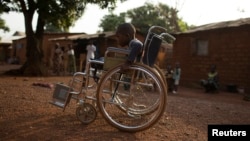Recently, Judith Heumann did something in Ethiopia that, just a decade ago, would have been impossible for her.
She took a train ride.
“I was in Ethiopia last week; I … [was] able to take a ride on the new light rail system, which enabled me as a wheelchair user to be able to get on the train,” she told African journalists during a recent briefing via teleconference from Washington.
Heumann, who is the United States' special adviser on international disability rights and who suffered a bout of childhood polio, said this small joy is one of the tangible signs that African nations are working to improve the lives of their disabled citizens.
Change has come slowly, she said, but meaningfully.
Kenya recently hosted the first general assembly of the African Disability Forum, and South Africa is currently marking Disability Rights Awareness Month by having Cabinet members weight a proposal to advance rights of disabled South Africans that would have binding commitments.
South Africa’s social development minister, Bathabile Dlamini, said such moves will only strengthen South African society.
"Empowerment is identified as a core cross-cutting theme for enabling persons with disabilities to avail of and access all socioeconomic development opportunities and rights that exist,” she said.
At least 15 percent of the world’s population is disabled, according to the World Health Organization and World Bank. That’s at least 1 billion people around the world — and they continue to face major challenges, Heumann said.
“Frequently in countries in Africa and around the world, we see that disabled individuals are highly stigmatized, and that stigmatization, I believe, also is one of the significant causes of people being marginalized,” she said. “When people do not believe that disabled individuals are capable of making meaningful contributions to their communities, then they are not necessarily looking at the types of laws and programs that need to be put in place.”
She added, however, that more African governments need to look at ways to put words into action. One step she suggests is for governments to look at hiring and promoting qualified people with disabilities to important positions.
In 2010, she said, U.S. President Barack Obama issued an executive order calling for a closer look at disabled government employees, resulting in more disabled persons having joined the ranks of the federal government.
“I think it is very important to be willing to listen to what civil society is saying in relationship to stigma and marginalization that they may be facing," she said. "And for the government itself to play a very proactive role in appointing disabled people to important positions, looking at the government, itself, to look at what it can be doing to hire more disabled individuals.”
Such change, however, will take time, she added, noting her own experience in the U.S. decades ago. She hopes that such change will become universal.
“I applied to be a teacher in the 1970's, with the Board of Education in the city of New York, and was denied my license specifically, in writing, because I was unable to walk,” she said. “I was lucky. I went to court. I did eventually get my teaching job; but today, the mere fact that an employer would write that I wasn’t qualified for a job because I couldn’t walk is completely illegal.”





